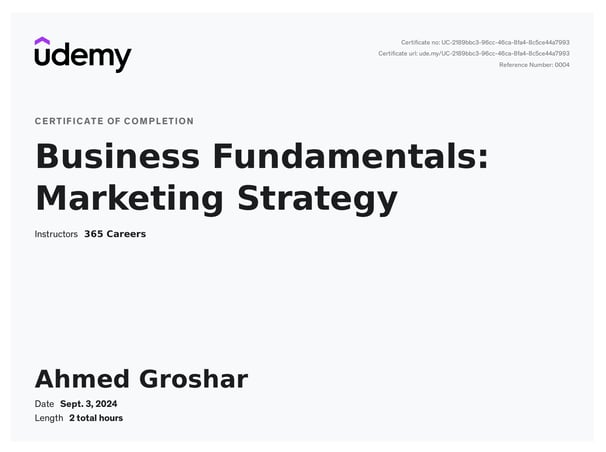innovation is a thought away
Targeted Reinvestment in Personal and Professional Developent
10 % of benefits are reinvested back into materials, training, conferences and building new projects.

Continuous Learning
A lifelong commitment to improvement
Certified Courses
This course provided foundational knowledge of artificial intelligence concepts and services on Microsoft Azure. Key takeaways include:
AI Fundamentals: Understanding core AI concepts, including machine learning, computer vision, and natural language processing.
Azure AI Services: Exploring key Azure AI offerings like Azure Machine Learning, Cognitive Services, and Bot Service.
Machine Learning Basics: Understanding supervised, unsupervised, and reinforcement learning, and using Azure tools to build models.
Computer Vision: Utilizing Azure's vision services for image recognition and object detection.
Natural Language Processing: Implementing text analytics, sentiment analysis, and language understanding with Azure.
Conversational AI: Building chatbots with Azure Bot Services and Language Understanding (LUIS).
Responsible AI: Understanding ethical considerations and best practices for responsible AI deployment.
AI Solution Deployment: Learning how to integrate AI solutions into applications using Azure resources.
This course strengthened my knowledge of AI technologies and how to leverage Microsoft Azure's suite of tools for building scalable, responsible AI-driven solutions.
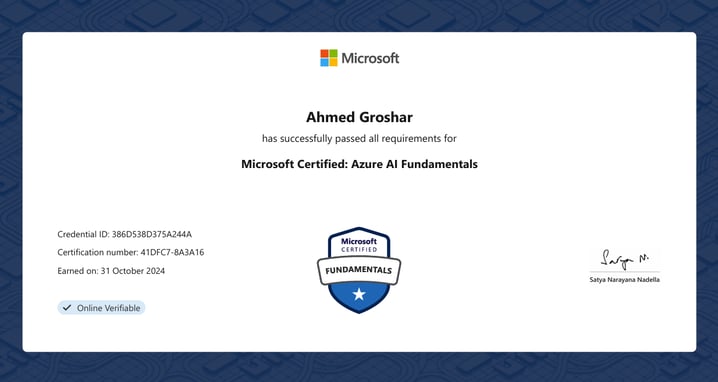

Step By Step Guide To Self Development As A Sales Professional which offers valuable insights into becoming a successful sales consultant. Key takeaways include:
Sales Process Mastery: Gaining a comprehensive understanding of the sales process from start to finish, including techniques for each stage.
Negotiation Skills: Learning how to successfully negotiate in any sales situation to ensure mutually beneficial outcomes.
Handling Objections: Discovering strategies for addressing and overcoming objections during sales meetings.
Reading Prospects: Developing the ability to assess and understand your prospects during sales meetings to better tailor your approach.
Emotional Management: Learning how to manage your emotions effectively in sales situations to maintain a calm and persuasive demeanor.
This course offers structured training for beginners, equipping you with the essential skills for developing sales strategies, closing deals, and identifying multiple sales opportunities.
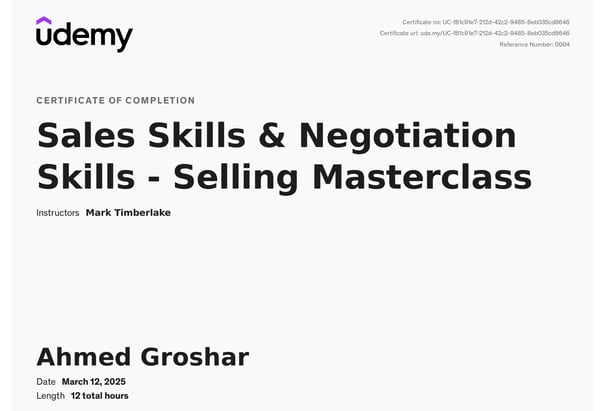

An extraordinary Strategic Marketing Masterclass by Professor Malcolm McDonald. Key takeaways include:
SWOT Analysis: Learning to leverage SWOT to drive marketing success.
Strategic Marketing Plan: The course provided tools and templates to create and implement effective marketing strategies.
Quantified Value Propositions: Discovering how financially quantifying value can differentiate a business and demonstrate its contribution to customer profitability.
Key Account Management: Gaining strategies for classifying and managing top customers.
Market Segmentation: The course covered effective segmentation techniques for targeting the right market.
Marketing Accountability & Gamification: Learning how to measure marketing profitability and use gamification for competitive advantage.
CEO Marketing Questions: Learning the key questions every CEO should ask to align marketing with company strategy.
This course provided essential tools and frameworks for developing successful, strategic marketing plans.
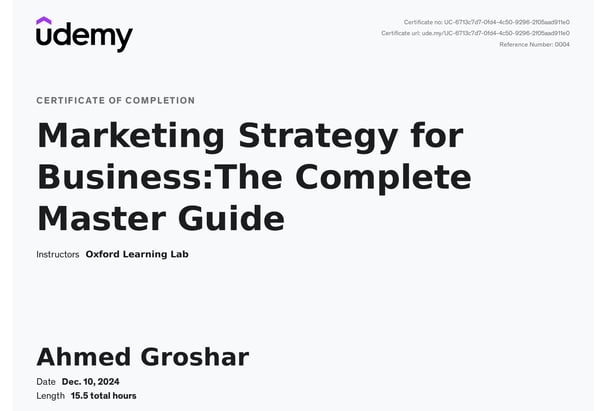

Key takeaways that helped me gain practical skills in data analysis and visualization:
Data Preparation & Shaping: Learnign how to efficiently connect, clean, and transform raw data using Power Query. This included using connectors, profiling tools, and performing data transformations like merging, pivoting, and unpivoting.
Data Modeling: The course deep-dived into creating relational data models. I learned best practices like using star schemas, managing primary and foreign keys, and understanding filter context and flow.
DAX for Calculated Fields: Gaining hands-on experience with DAX to create calculated columns and measures. Key functions I used included CALCULATE, FILTER, and time intelligence patterns, helping me perform complex calculations and data analysis.
Visualization & Dashboarding: Learning how to build interactive and visually appealing reports. This included creating KPIs, using line charts, map visuals, and setting up drill-through and report slicers to allow deeper insights into data.
Real-World Project: Guiding through a real-world project, transforming raw data into valuable business insights and tracking KPIs.
Overall, the course gaves structured approach to mastering Power BI, from data prep to visualization which prepares for using it for real-world business intelligence tasks.
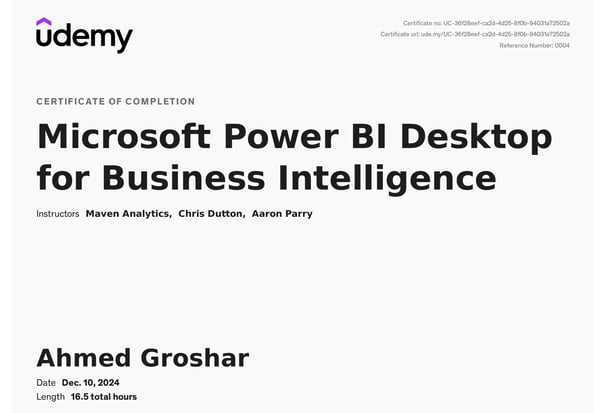

Learn the essentials of vision, strategy, and metrics to drive business success. Discover how leaders use vision to guide their companies, apply OKRs to track progress, and implement agile roadmaps for product development.
Key Learning Objectives:
Differentiate between vision and strategy and learn how leaders leverage vision for success.
Use frameworks like OKRs and agile roadmaps to align and track product development.
Understand key metrics, from leading vs. lagging to cohort analysis and t-tests.
Learn when to rely on data versus intuition and how to debug and recognize metric anomalies across industries like e-commerce, mobile, and marketplaces.
Ideal for entrepreneurs and managers seeking to refine their approach to business strategy, product development, and data-driven decision-making.
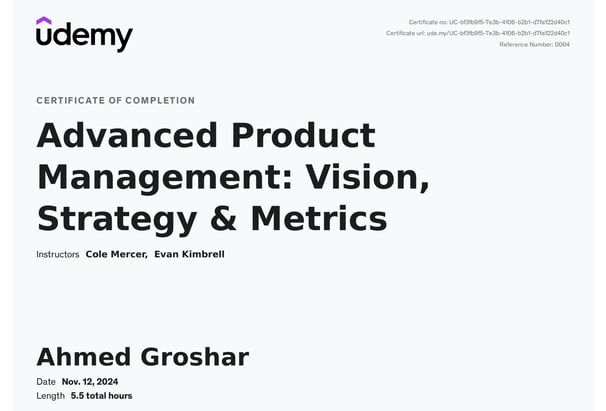

Master the essential concepts, skills, and frameworks for entrepreneurship. Learn how to differentiate myths from realities, assess your strengths, and apply effective techniques to generate, validate, and execute business ideas.
Key Learning Objectives:
Understand core entrepreneurship concepts and assess personal traits for success.
Use frameworks like Lean Startup, business modeling, and scalability to generate and validate ideas.
Explore financing options, including angel investors and small business loans.
Learn to identify, evaluate, and prioritize actionable business ideas using proven techniques.
Apply disruptive business models and innovation to create and scale impactful businesses.
Perfect for aspiring entrepreneurs seeking a practical, results-driven approach to turning ideas into viable businesses.
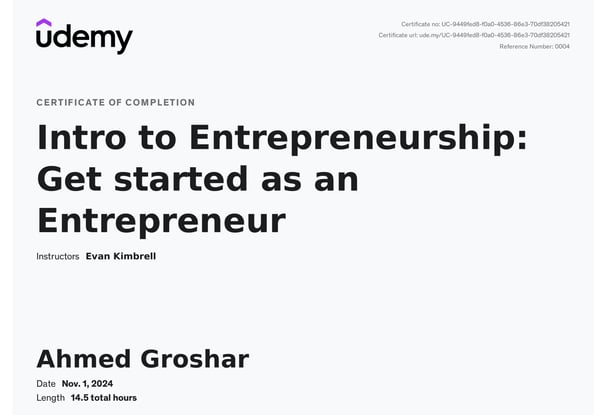

This comprehensive course offers 30+ hours of in-depth training on mastering communication skills for personal and professional success. Taught by TJ Walker, an expert with 30 years of experience training top leaders worldwide, the course covers a wide range of scenarios: job interviews, pitching investors, public speaking, leadership communication, and more.
Key topics include:
Mastering communication for various situations (one-on-one, presentations, public speaking, etc.)
Developing persuasion, assertiveness, and business communication skills.
Practical tips for overcoming fear, building confidence, and delivering impactful messages.
Techniques for effective communication with colleagues, executives, and large audiences.
Real-world advice for improving leadership and social skills.
The course focuses on actionable techniques and encourages interactive practice, making it ideal for anyone looking to enhance their communication abilities, leadership presence, and public speaking skills.
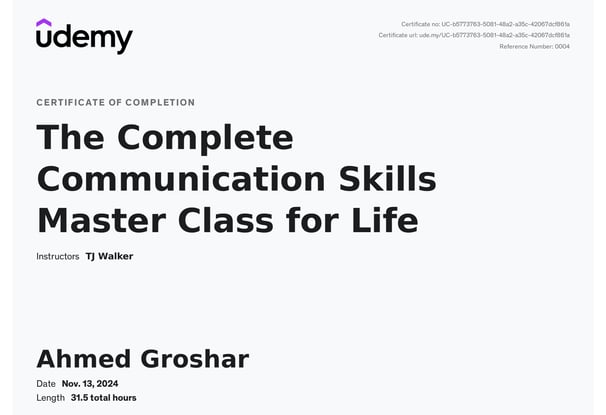

This course covered essential skills and knowledge for aspiring Product Managers, including:
Product Management Roles: Understanding the different types of Product Manager roles and finding the best fit.
Product Lifecycle & Development: Mastering the product lifecycle, development processes, and customer problem-solving.
Customer Insights: Conducting interviews, building user personas, and identifying pain points.
Competitive Analysis: Analyzing competitors and differentiating between various types.
Wireframes & Prototyping: Creating wireframes and prototypes using tools like Balsamiq and POP.
Product Planning: Building roadmaps, backlogs, and prioritizing features using Agile and Waterfall methods.
Metrics & Experimentation: Tracking metrics with AARRR and HEART frameworks, running MVP experiments.
Technical Knowledge: Understanding APIs, tech stacks, cloud computing, and front-end vs. back-end development.
Communication: Effective communication with engineers, designers, and executives.
Career Preparation: Building a portfolio, crafting resumes, and acing interviews for Product Manager roles.
This course enhanced my ability to drive product success and effectively communicate across teams while preparing for a career in Product Management.
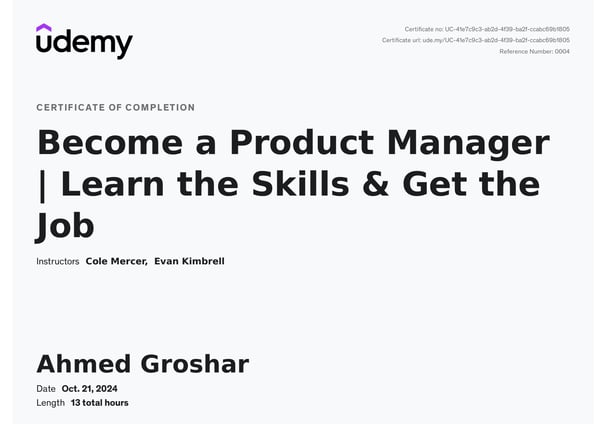

This course provided essential strategies to enhance negotiation effectiveness. Key takeaways include:
Core Principles: Understanding negotiation fundamentals and creating win-win solutions.
Communication & Listening: Mastering persuasive communication and active listening.
Nonverbal Cues: Using body language to influence outcomes.
Trust & Rapport: Building trust for smoother negotiations.
Preparation & Goals: Researching, strategizing, and setting SMART goals.
Bargaining Techniques: Applying anchoring, framing, and concession tactics.
Cultural Awareness: Adapting to cross-cultural negotiations.
Managing Challenges: Handling difficult personalities and power dynamics.
Time Management & Influence: Navigating time pressure and leveraging influence.
Relationship Building: Maintaining positive connections post-negotiation.
Self-Improvement: Continuous reflection to refine skills.
This course strengthened my ability to navigate complex negotiations with confidence, clarity, and adaptability.
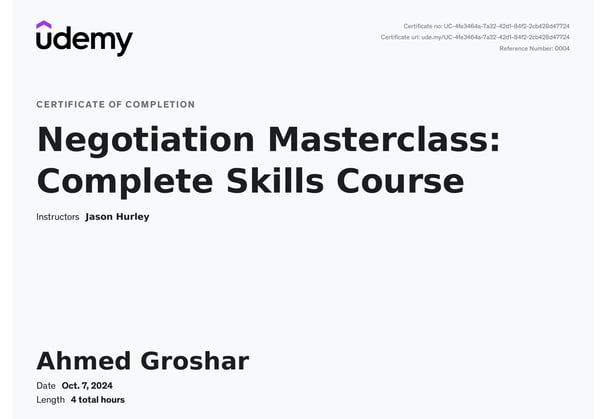

This course focused on key frameworks and strategies for analyzing industries and competitors to achieve sustainable competitive advantage. Major takeaways include:
Industry & Competitor Analysis: Leveraging tools like Porter’s Five Forces to assess market forces (supplier/client power, new entrants, substitutes) and SWOT analysis to evaluate strengths, weaknesses, opportunities, and threats.
Game Theory: Analyzing strategic competitor behavior, balancing cooperation and competition.
Competitive Advantage: Understanding core strategies — cost leadership, differentiation, and niche — and how businesses position themselves effectively.
Integration Strategies: Exploring the benefits and trade-offs of vertical and horizontal integration to control more of the supply chain or expand across industries.
The course provided practical approaches for strategic planning, enhancing market positioning, and navigating competitive environments to improve business outcomes.
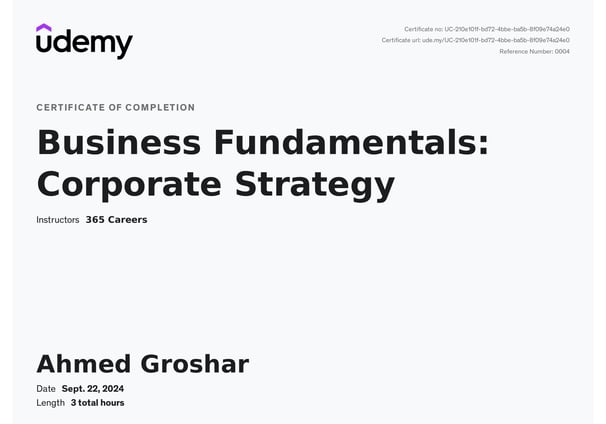

This course explored key marketing principles, highlighting its importance in driving business growth and customer engagement. Key takeaways include:
Importance of Marketing: Builds brand awareness, drives sales, and fosters customer loyalty.
Marketing as a Career: Combines creativity, data analysis, and strategy to influence markets.
Marketing Plan Development: Involves setting clear goals, understanding competitors, and actionable promotion steps.
Understanding Customers: Addressing needs, wants, and demands to deliver tailored solutions.
Marketing Research: Gathers insights to guide informed decisions.
Customer Segmentation: Targets specific market groups for greater impact.
4Ps of Marketing: Product, Price, Place, and Promotion balance value creation.
Product Mix & Pricing: Aligning product portfolios and pricing for profitability.
Marketing Campaigns: Planning, executing, and measuring outreach efforts effectively.
Customer Lifetime Value (CLV): Measures long-term profitability and guides retention strategies.
This course provided practical skills for research, strategic planning, and customer-centric approaches to create impactful marketing initiatives.
